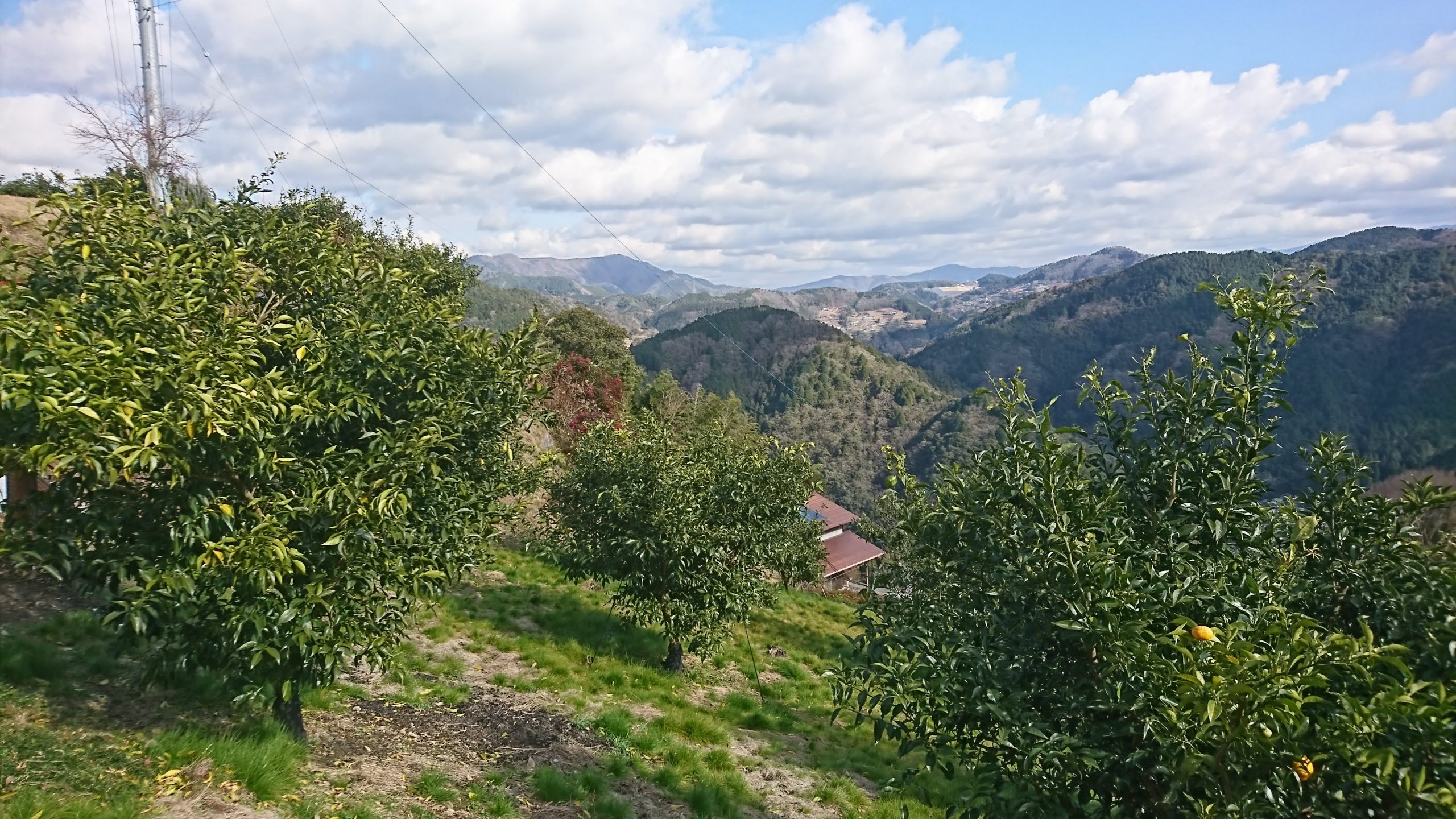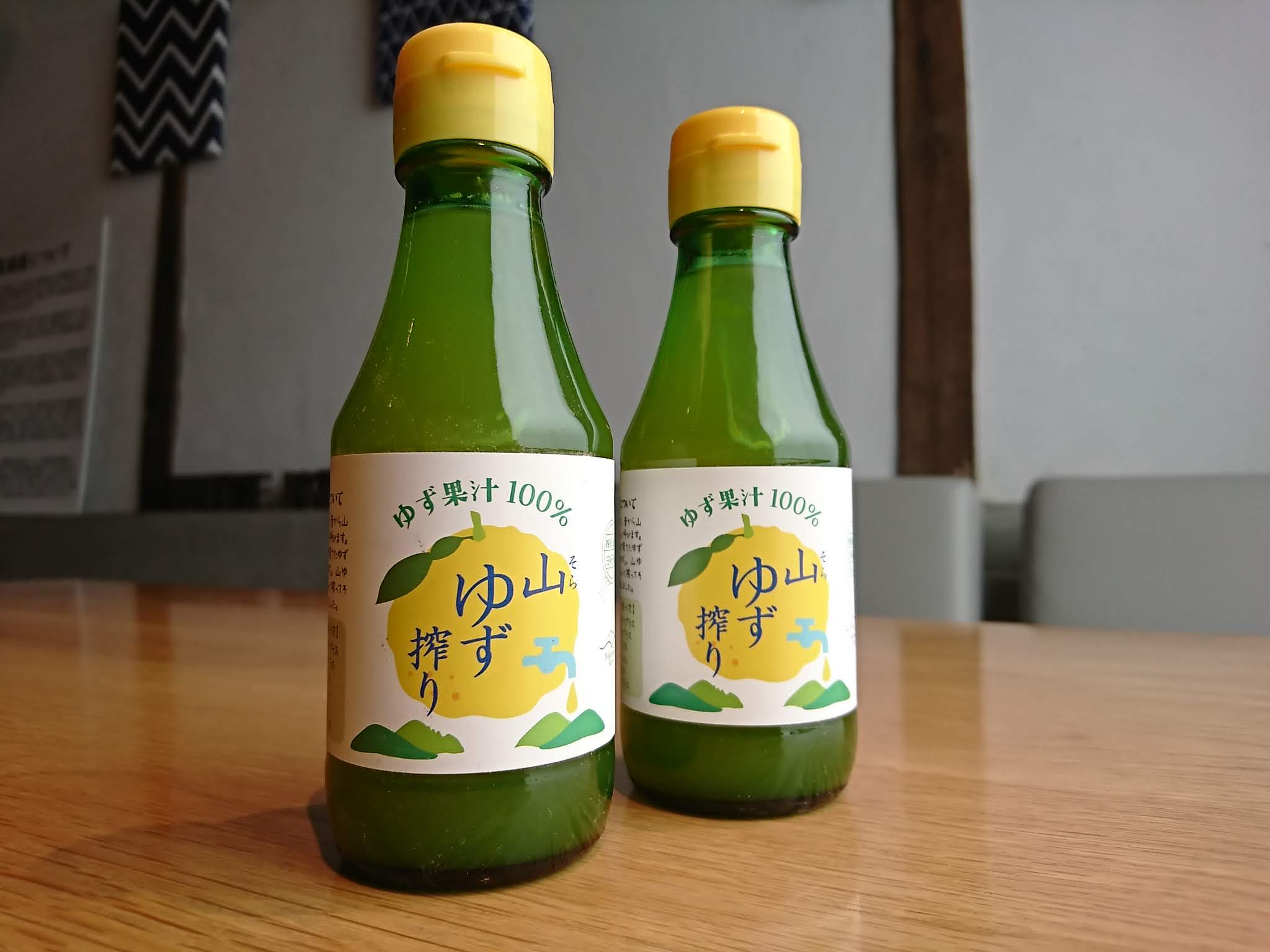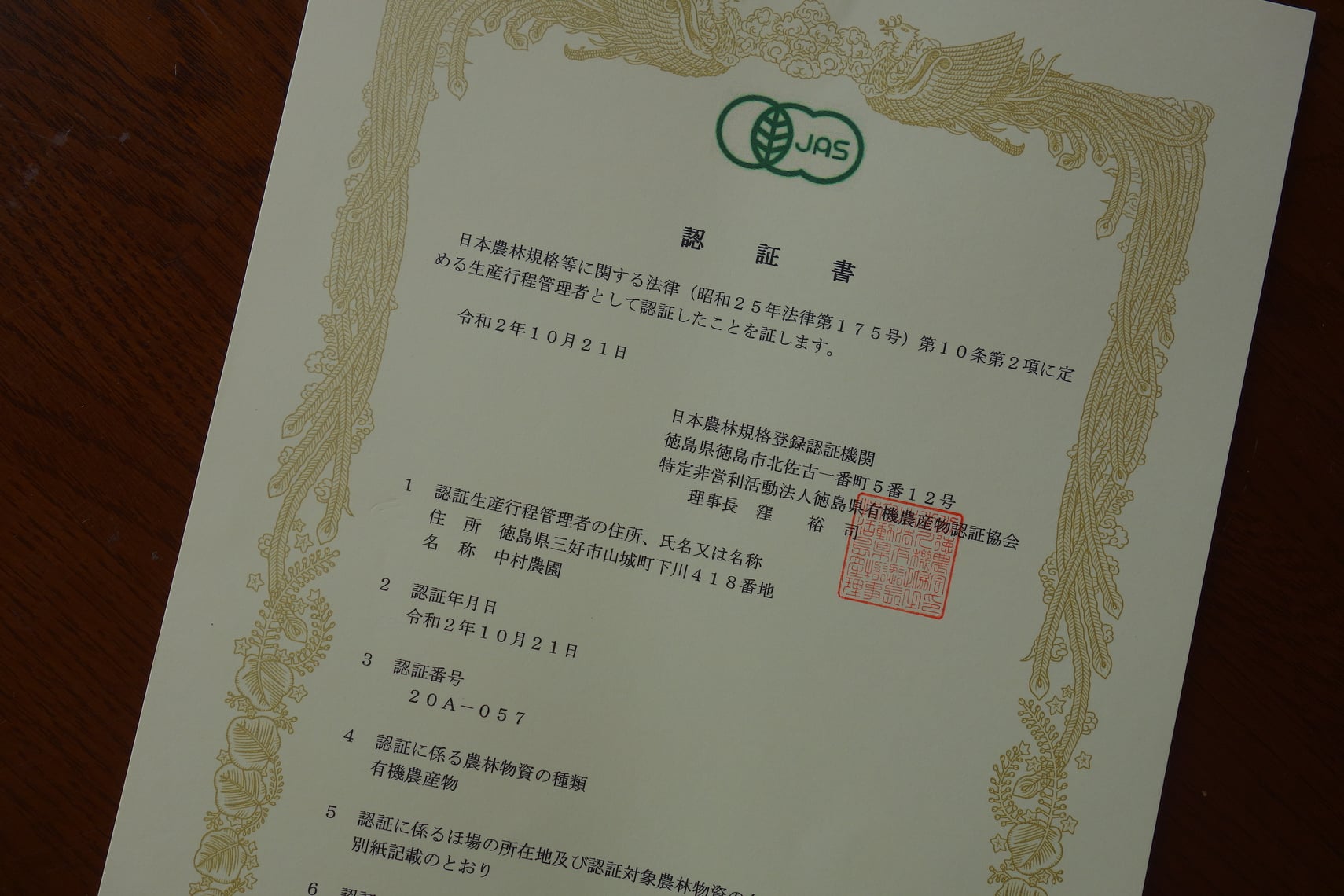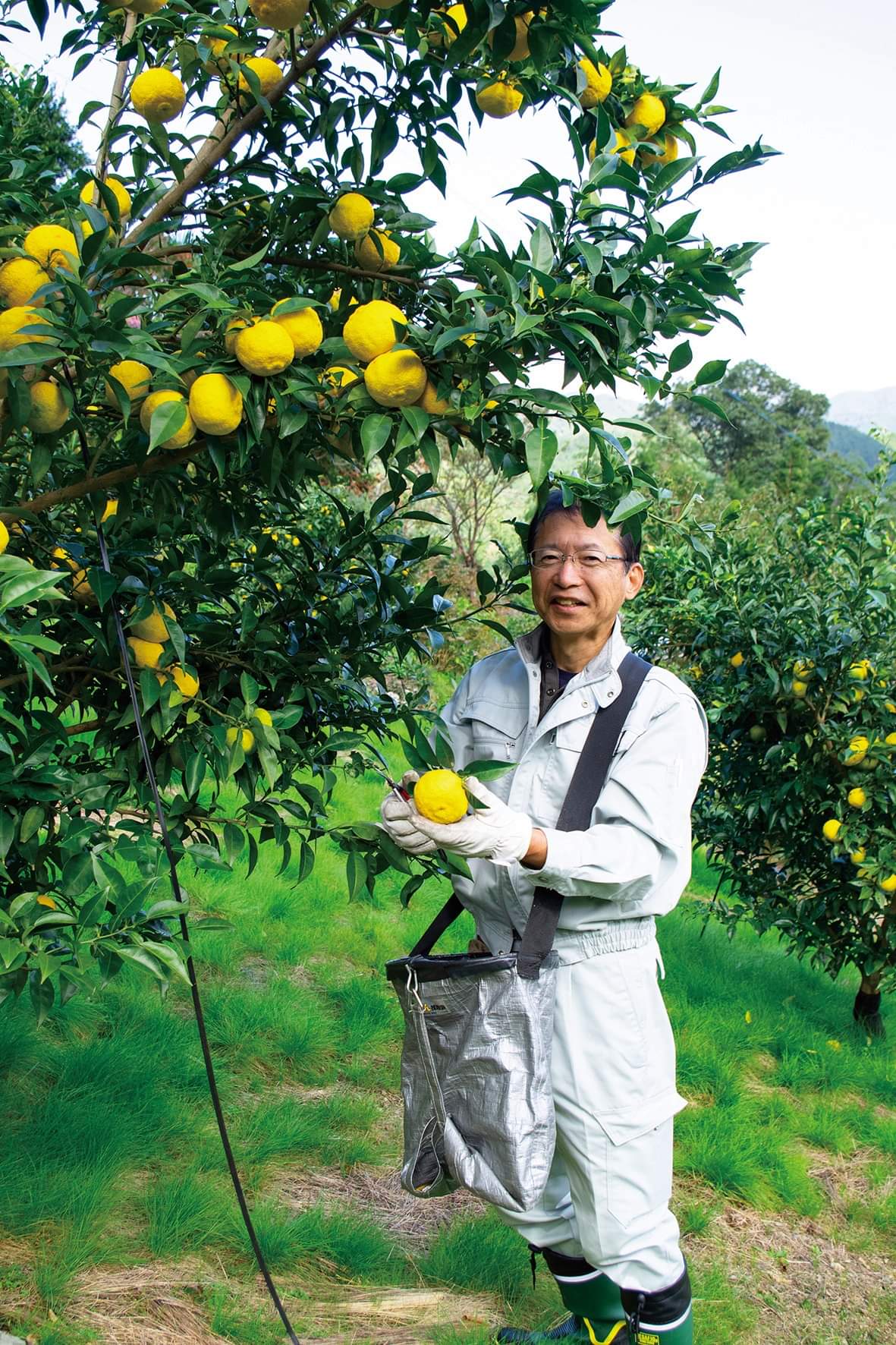[MIYOSHI JIN] The Tokushima Yuzu from the Sky – Vol. 2: Growing yuzu safely, with Hiroshi Nakamura
2020.12.16
In the Awa area of Tokushima Prefecture, people have long called mountains that seem to reach into the sky the name “sora” or “sky.” The yuzu orchard at Nakamura Farm can be found on the steep slope of a mountain called Sora. 
“Look at this view. Isn’t it amazing? It’s like we’re floating in the middle of the sky. This is why we call the fruit we grow here Tenkū no Tokushima Yuzu (Tokushima Yuzu from the Sky),” says Hiroshi Nakamura of Nakamura Farm.
Nakamura Farm sells yuzu juice under the name Sora Yuzu Shibori (600 yen, tax included). The interesting thing about the name is that it includes a reference to Nakamura’s name for his fruit; the juice’s label has the character for “mountain” but the pronunciation for “sky.” The farm is also developing new products in collaboration with other local companies, with one called Yuzu Syrup due to go on sale starting in the spring. That is just part of the fun for Nakamura. (Sora Yuzu Shibori will be discontinued when the syrup is released.)
When Nakamura showed me around the orchard, I was surprised at how soft the ground was.
“It’s really bouncy and soft, right?” Nakamura said. “That’s because the undergrowth is all naginata-gaya.”
Naginata-gaya is a type of flowering grass. It grows long in spring then dries up, leaving behind a bed of grass stalks on the ground like straw. That helps prevent erosion and nutrient outflow, and helps keep soil temperature down and soil moisture levels up in the summer, thereby allowing for better root growth.
The dried grass plays a vital role in soil maintenance as well. It is a source of organic material, and when the roots of the grass wither away they leave holes in the ground improving soil breathability, and allowing organic nutrients and water to slowly be absorbed into the soil.
This is why he doesn’t use herbicides or chemical pesticides. He has created the perfect environment for yuzu trees by harnessing the power of nature, using only limited amounts of pesticides derived from natural products that are accepted in organic farming, natural enemies of pests, and microorganisms in the soil.
Nakamura wants to make sure that people feel safe when they eat the yuzu he “grows in the sky,” so in October 2020, he was certified as an organic producer. Called Organic JAS, farmed are evaluated under the Japanese Agricultural Standard (JAS), and certification is only given to agricultural products that meet certain levels of quality and labelling as stipulated by the Ministry of Agriculture, Forestry and Fisheries. Only yuzu certified as Organic JAS can be labelled “organic yuzu.”
The main standards a producer must meet under Organic JAS are the following.
- Soil must be conditioned with compost and other natural materials, and no chemical fertilizer or pesticides can have been used on the soil for at least three years (for perennial crops) before harvesting.
- No prohibited chemical fertilizers or pesticides may be used on the crop during the cultivation period.
- Genetically modified seedlings are prohibited from use.
- After harvesting, products must not be mixed with non-organic produce or be contaminated with chemicals.
- Records must be kept detailing the entire production process from planting to shipment.
There is a broad variety of additional regulations governing seedling types, machinery and tool management, storage, and more. Moreover, third-party on-site inspections must be conducted annually to confirm that standards are being met.
Nakamura managed to meet these strict requirements and earn Organic JAS certification. That is why his fruit and fruit products, from juice to skin, can all be safely used in cooking.
All foods have a story to tell. Learning how something is made simply adds to the appeal. If we can share with people the feelings that lie at the heart of the name Tokushima Yuzu from the Sky, if we can show them the incredible beauty of the environment the yuzu are grown in, and if they can see the safe and healthy growing system in place, then the foods of Miyoshi will surely grow in popularity.
Nakamura Farm website: https://www.nakamurafarm.com/
(Interview and article: Tatsuya Ogake)
Related Posts
-
Exploring Oboke Gorge – Part 2 | A Place for Food, Fun… and Monsters?!
The thrilling cliffs of Oboke Gorge are formed by the mighty Yoshino River as it cuts its way throug
2023.03.21
-
Exploring Oboke Gorge – Part 1 | A Natural Wonder of Miyoshi City
The mighty Yoshino River flows across much of Shikoku, and as it cuts its way through the rugged mou
2023.03.20
-
Iya Kanko Ryokan – Part 3 | Inheriting the Tastes of the Iya Valley
Just a few minute walk from the famed Kazurabashi Vine Bridge, the Iya Kanko Ryokan has been welcomi
2023.03.19
-
Iya Kanko Ryokan – Part 2 | A Family-Run Business Where Life is a Juggle
The Kazurabashi Vine Bridge is one of the most renowned sights of the Iya Valley, and just a couple
2023.03.18
-
Iya Kanko Ryokan – Part 1 | A Traditional Inn near the Kazurabashi Vine Bridge
Acclaimed as one of Japan’s Three Unusual Bridges, the Kazurabashi Vine Bridge is one of the most fa
2023.03.17
-
The Shikoku “Yukigassen” Snowball Fight – Part 2 | The Heat of the Battle in Icy Conditions
The 19th annual “Yukigassen” Snowball Fight Tournament was held recently in the deep mountains of Mi
2023.02.19



















